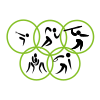Iccus of Taranto ( Ancient Greek: Ἴκκος) (5th century BC) was a Magna Grecia Olympic athlete, a victor during the 84th Games (444 BC) [1] or 70th Games (470 BC) according to older sources. [2] He is considered the father of athletic dietology. He prepared himself physically before competing according to ethical-religious Pythagorean concepts by abstaining from sexual intercourse and a frugal diet specially prepared. He also taught these principles. [3] Pausanias calls him the best gymnast of his age, [4] and Plato also mentions him with great praise. [5]
Iamblichus calls him a Pythagorean. [6][ failed verification] According to Themistius, [7] Plato reckoned him among the sophists. Specifically, in Plato's dialogue Protagoras, the sophist Protagoras lists Iccus alongside Homer, Hesiod, Simonides, Orpheus, Musaeus, Herodicus, Agathocles tutor of Damon, and Pythoclides as fellow sophists (that is, improvers of youth) who chose to present themselves as poets, athletes, or musicians for fear of public disapproval. [8]
References
- ^ Moretti, Luigi (2014). «Luigi Moretti e il catalogo degli Olympionikai. Testimonianze epigrafiche, letterarie, papirologiche e numismatiche sui vincitori degli agoni olimpici panellenici (Ellade e Magna Grecia: 776 a.C. - 393 d.C.)». Maria Elisa Garcia Barraco. AM; 7 - Arbor Sapientiae Editore S.r.l., Iccus, p. 74. ISBN 978-88-97805-32-8.
- ^ "Iccus - A Dictionary of Greek and Roman biography and mythology - William Smith, Ed". www.perseus.tufts.edu. Retrieved 2016-06-05.
- ^ L’Arte ginnica di Icco da Taranto nel contesto socio-culturale della Magna Grecia; Luigi Stroppiana, Medicina nei Secoli arte e Scienza, 1989, 1:3-12, Roma; ISSN 0394-9001
- ^ Pausanias, vi. 10. §5-6
- ^ Plato, de Leg. viii. p. 840, Protag. p. 316, with the Scholium; comp. Lucian, Quomodo Hist, sit conscrib. 35; Aelian, Varia Historia xi. 3
- ^ Iamblichus. De Vita Pythagorica. p. 36.
- ^ Themistius, Orationes xxiii.
- ^ Plato. Martin Ostwald; Gregory Vlastos (eds.). Protagoras (PDF). Translated by Benjamin Jowett. p. 316d–316e.
Iccus of Taranto ( Ancient Greek: Ἴκκος) (5th century BC) was a Magna Grecia Olympic athlete, a victor during the 84th Games (444 BC) [1] or 70th Games (470 BC) according to older sources. [2] He is considered the father of athletic dietology. He prepared himself physically before competing according to ethical-religious Pythagorean concepts by abstaining from sexual intercourse and a frugal diet specially prepared. He also taught these principles. [3] Pausanias calls him the best gymnast of his age, [4] and Plato also mentions him with great praise. [5]
Iamblichus calls him a Pythagorean. [6][ failed verification] According to Themistius, [7] Plato reckoned him among the sophists. Specifically, in Plato's dialogue Protagoras, the sophist Protagoras lists Iccus alongside Homer, Hesiod, Simonides, Orpheus, Musaeus, Herodicus, Agathocles tutor of Damon, and Pythoclides as fellow sophists (that is, improvers of youth) who chose to present themselves as poets, athletes, or musicians for fear of public disapproval. [8]
References
- ^ Moretti, Luigi (2014). «Luigi Moretti e il catalogo degli Olympionikai. Testimonianze epigrafiche, letterarie, papirologiche e numismatiche sui vincitori degli agoni olimpici panellenici (Ellade e Magna Grecia: 776 a.C. - 393 d.C.)». Maria Elisa Garcia Barraco. AM; 7 - Arbor Sapientiae Editore S.r.l., Iccus, p. 74. ISBN 978-88-97805-32-8.
- ^ "Iccus - A Dictionary of Greek and Roman biography and mythology - William Smith, Ed". www.perseus.tufts.edu. Retrieved 2016-06-05.
- ^ L’Arte ginnica di Icco da Taranto nel contesto socio-culturale della Magna Grecia; Luigi Stroppiana, Medicina nei Secoli arte e Scienza, 1989, 1:3-12, Roma; ISSN 0394-9001
- ^ Pausanias, vi. 10. §5-6
- ^ Plato, de Leg. viii. p. 840, Protag. p. 316, with the Scholium; comp. Lucian, Quomodo Hist, sit conscrib. 35; Aelian, Varia Historia xi. 3
- ^ Iamblichus. De Vita Pythagorica. p. 36.
- ^ Themistius, Orationes xxiii.
- ^ Plato. Martin Ostwald; Gregory Vlastos (eds.). Protagoras (PDF). Translated by Benjamin Jowett. p. 316d–316e.
